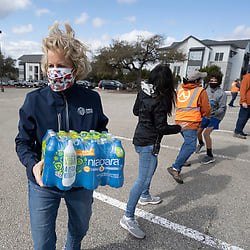In order to raise awareness of civics and government in Travis County, Austin Tech Alliance conducts periodic interviews with our elected officials. ATA had a Q&A with Ann Howard, County Commissioner for Precinct Three. We talked about running for office, tech, the pandemic and how to get involved.
What inspired your run for county commissioner and your desire to be involved in local politics?
 I’ve been active in community life in Travis County for 27 years. The 8 years I served as the Executive Director of the Ending Community Homelessness Coalition (ECHO) after decades of work on education, youth and justice issues solidified my decision to run for County Commissioner of Precinct 3, as I realized I wanted to get much more done than I could in my nonprofit role and that I needed to be a policymaker and have a vote to do that. I ran believing that my experience and success bringing people with differing and even competing views together to reach innovative solutions will help Travis County to effectively address transportation, water, justice and other strategically important issues that impact our quality of life now & in the decades ahead. And while I had never run for office before, I viewed my work promoting school bonds and housing bonds and advocating for needs of children and families and veterans as politics, just not party politics.
I’ve been active in community life in Travis County for 27 years. The 8 years I served as the Executive Director of the Ending Community Homelessness Coalition (ECHO) after decades of work on education, youth and justice issues solidified my decision to run for County Commissioner of Precinct 3, as I realized I wanted to get much more done than I could in my nonprofit role and that I needed to be a policymaker and have a vote to do that. I ran believing that my experience and success bringing people with differing and even competing views together to reach innovative solutions will help Travis County to effectively address transportation, water, justice and other strategically important issues that impact our quality of life now & in the decades ahead. And while I had never run for office before, I viewed my work promoting school bonds and housing bonds and advocating for needs of children and families and veterans as politics, just not party politics.
What are your general priorities for this term as county commissioner?
In general, I want my office to be a place of answers for constituents. I’m trying to use the telephone and social media as my megaphone to give constituents timely answers to their questions and to efficiently meet their needs whenever possible. My staff are experienced and all are residents of Precinct 3 so we are ready to serve. Precinct 3 stretches from downtown Austin to beyond Briarcliff on SH 71 to Jonestown on SH 1431 and growing communities along 620 and 183. Precinct 3 is challenged to balance growth with environmental stewardship amidst the governmental jumble that oversees transportation, land use and water. My office will emphasize customer service so we can help our neighbors understand which governmental agency governs what, what policy options exist and how we work together to move real solutions forward.
What do you believe are the biggest issues the people of Austin are facing right now, especially relating to the pandemic?
 Related to the pandemic, people need access to vaccinations and need government to provide sound guidance to keep us safe. People also need income so they can provide for their families. Many people who have never before needed assistance need it now, and people who have been waiting for access to healthcare and housing need it more now than in the months and years they have been waiting. Federal assistance is helpful, and I’m certain people want to return to work across sectors – and children to classrooms – as soon as it is safe to do so. It’s clear to me that people understand how interconnected we are, and that government policy needs to better reflect that. For example, all neighborhoods need clean drinking water and sufficient flow to fight fires – all the time. People need affordable housing and reliable transportation so they can access employment, schools, retail and health care. We know incarceration isn’t the answer for mental illness and addiction, but successful justice reform necessitates access to housing, treatment and living wage jobs. The pandemic seems to be making our area all the more popular, so with this growth, I’m laser focused on wildfire prevention, affordable housing and reliable modes of transportation.
Related to the pandemic, people need access to vaccinations and need government to provide sound guidance to keep us safe. People also need income so they can provide for their families. Many people who have never before needed assistance need it now, and people who have been waiting for access to healthcare and housing need it more now than in the months and years they have been waiting. Federal assistance is helpful, and I’m certain people want to return to work across sectors – and children to classrooms – as soon as it is safe to do so. It’s clear to me that people understand how interconnected we are, and that government policy needs to better reflect that. For example, all neighborhoods need clean drinking water and sufficient flow to fight fires – all the time. People need affordable housing and reliable transportation so they can access employment, schools, retail and health care. We know incarceration isn’t the answer for mental illness and addiction, but successful justice reform necessitates access to housing, treatment and living wage jobs. The pandemic seems to be making our area all the more popular, so with this growth, I’m laser focused on wildfire prevention, affordable housing and reliable modes of transportation.
What do you think is the best way Austinites to get involved in local politics?
I encourage folks to volunteer where they live and work and take leadership roles when they can. PTAs, Little League, Scouts, non-profit organizations in the arts, environment, social services, and faith groups… all of these need people to put time and energy into them and they are great places to test your appetite for community responsibility. School boards and city council are non-partisan but political races with political primaries are long and expensive. So do some soul searching and get some experience to determine what is right for you.
How does or might the city partner with local businesses or tech companies to make the city function optimally? How can technology help Austin return to more normalcy?
I believe in collaboration and want government to ask the experts how best craft a policy so it delivers the intended solution. Many tech companies connected with the Chamber of Commerce to discuss how to safely respond, recover and re-open regarding COVID. We rely on businesses to liaison between workforce and government. Vaccination sign ups and broadband access are two perfect examples of critical technology needed in the last year. Government isn’t nimble so we need the private sector to show the way and then partner with government to scale solutions.
In Precinct 3, developers are building new subdivisions and I want them to use the latest science to understand the surroundings around that subdivision. What’s the fire risk, where does drinking water come from, how do neighbors access fresh food and schools? These questions require research and sometimes, investments other than the houses being built. We must be smart and constantly thinking about the big picture.
To contact Commissioner Ann Howard visit her website.
